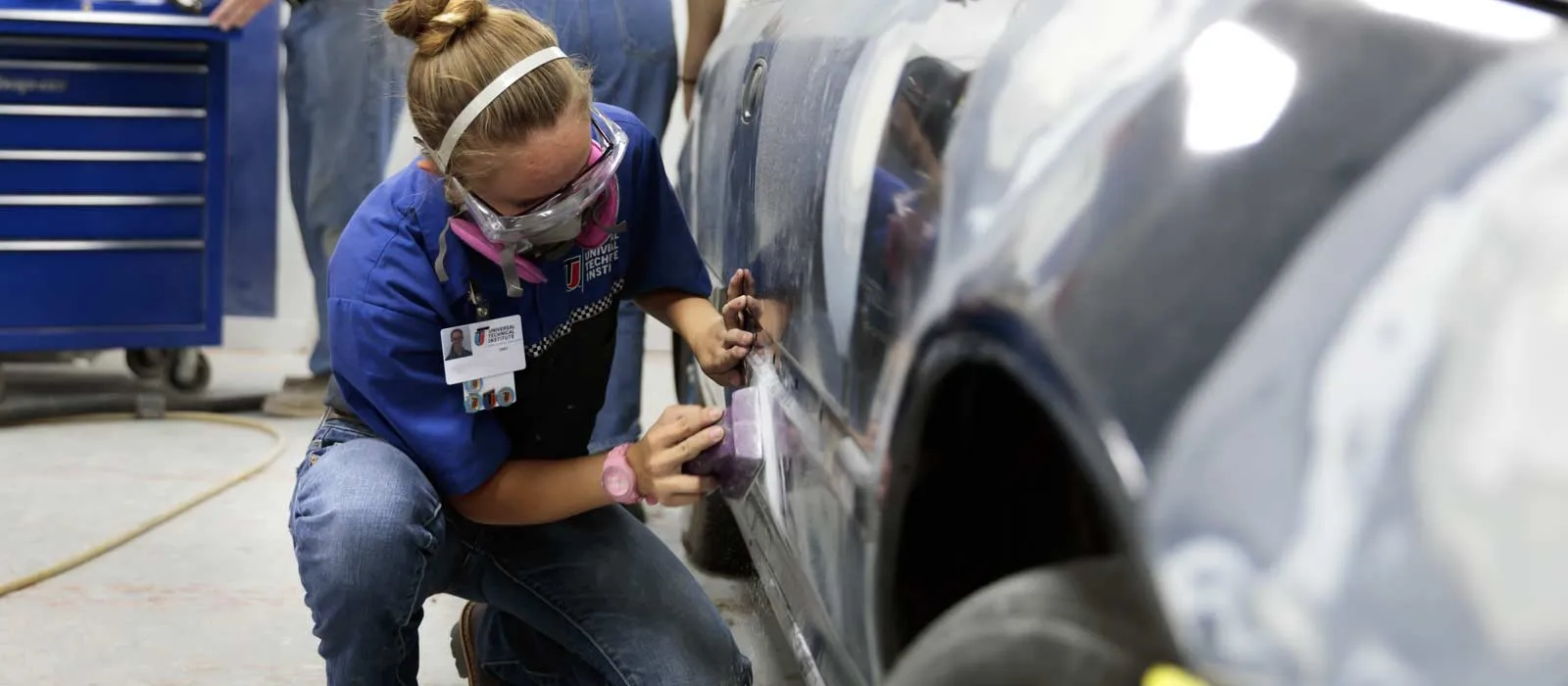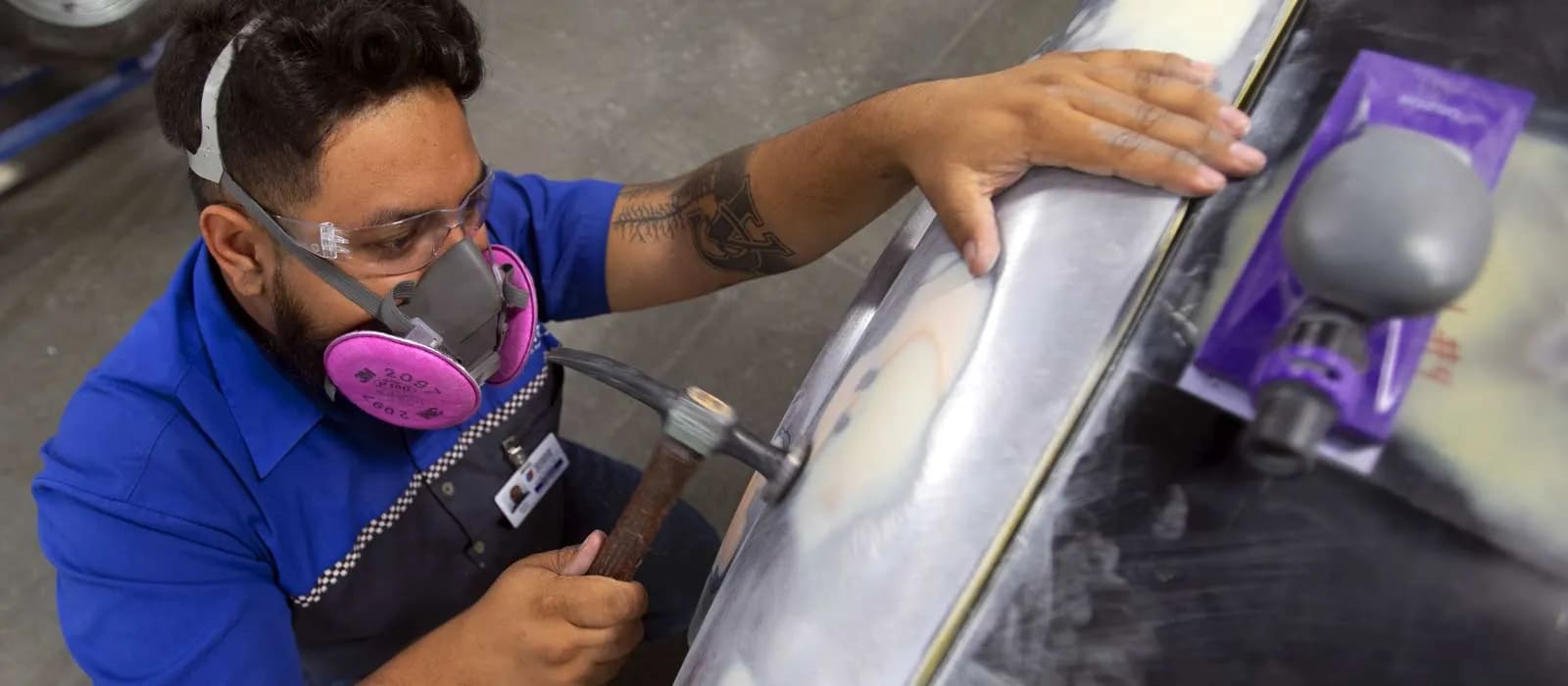Collision Repair Careers: Industry Career Opportunities
There are a number of career opportunities in the auto collision industry. Learn all the steps to become a collision repair technician here!
It’s often said that a technician is only as good as his or her tools. This is certainly the case when it comes to collision repair!
Collision repair technicians analyze, diagnose and repair damaged vehicles. Accidents happen on our roadways every day, and these technicians play an important role in getting vehicles back up and running. To do their job well, they must have a specific set of tools they can rely on.
If you’re considering a career in this industry or are currently completing your collision repair training program, this list is for you. Follow along as we share a complete auto body tools list.
Key Points:
- Collision repair technicians are essential for analyzing, diagnosing and repairing vehicles damaged in accidents, requiring a specific set of tools to perform their jobs effectively.
- Aspiring technicians are advised to start building their toolset early, with a basic collection expected by potential employers, including a variety of sockets, ratchets, wrenches, screwdrivers, pliers, hammers, chisels, punches, dollies and other specialized tools.
- The list of necessary tools for a collision repair technician is extensive, covering everything from standard and metric socket sets to professional screwdriver sets, locking pliers, hammers and advanced painting guns for topcoat and primer application.
- Building a tool set can be a gradual process, with opportunities to acquire tools as gifts or at discounted prices through programs like the Snap-on® Student Excellence Program offered by Universal Technical Institute (UTI) or by purchasing from retiring technicians.19
- UTI offers a collision repair training program designed to equip students with the necessary knowledge, skills and hands-on education needed for a career in the industry, with campuses in Houston, Texas, and Long Beach, California.1
Finding the right tools for auto body repair involves understanding the specific needs of the job and where to source quality equipment. UTI offers comprehensive training programs in collision and auto body repair, providing students with hands-on training using industry-standard tools and equipment.
This exposure helps aspiring technicians become familiar with the tools used in the industry. Additionally, UTI's relationships with leading manufacturers ensure that students train with state-of-the-industry tools and technology.
For those looking to purchase tools, it's beneficial to explore specialized automotive tool suppliers, online marketplaces and local hardware stores, ensuring the tools meet professional standards and are suitable for specific repair tasks.

As an aspiring collision repair technician, it’s important to start building your toolset as soon as possible. According to David Sydnor, Education Manager for the Collision Repair & Refinish Technology (CRRT) program at UTI, it’s critical to have a set of tools before sitting down for an interview with your future employer.
While many companies will provide the specialty tools used on the job, technicians are expected to have a basic set of tools. Tools for car body repair include:
o 3/8"
o7/16"
o 1/2"
o 9/16"
o 5/8"
o 11/16"
o 3/4"
o 13/16"
o 7/8"
o 15/16"
o 1"
o 9mm
o 10mm
o 11mm
o 12mm
o 13mm
o 14mm
o 15mm
o 16mm
o 17mm
o 18mm
o 19mm
o 5/16"
o 3/8"
o 7/16"
o 1/2"
o 9/16"
o 5/8"
o 11/16"
o 3/4"
o 13/16"
o 7/8"
o 9mm
o 19mm
o 21mm
o 10mm
o 12mm
o 13mm
o 14mm
o 15mm
o 17mm
o 18mm
o 19mm
o 21mm
o 1/4"
o 5/16"
o 3/8"
o 7/16"
o 1/2"
o 9/16"
o 5/8"
o 11/16"
o 3/4"
o 13/16"
o 7/8"
o 15/16"
o 1"
o 7mm
o 8mm
o 9mm
o 10mm
o 11mm
o 12mm
o 13mm
o 14mm
o 15mm
o 16mm
o 17mm
o 18mm
o 19mm
o 1/4" x 4"
o 3/8" x S"
o 1/2" x 5-3/4"
o 1/0" pin
o 1/1G" pin
o 3/32" pin
o 5/32" pin
o 5/32" line-up
o Universal
o Heel
o Combination
o Panel
Don’t forget a cart or rolling box that organizes your tools so they’re easy to use.

This is a long list, and it might seem overwhelming to those just starting out. Remember that you can build your tool set over time as you complete your training. David suggests letting friends and family know that you’re building your tool set so that when Christmas and birthdays come around, you can receive tools as gifts.
Be sure to also do your research and take advantage of UTI’s industry connections to talk with potential employers and ask what tools you’ll be expected to have. Not only will this make a great impression, but it can also guide you as you add tools to your set.
Finally, there may be ways to save money when purchasing your tools. UTI has a close relationship with Snap-on, a leading manufacturer of high-end tools and equipment for professionals in the transportation industry. Through UTI’s Snap-on Student Excellence Program, students can receive discounts on tools while they are enrolled at UTI.19
Additionally, as technicians retire, many choose to sell their tools to the next generation. Take advantage of your network—you may be able to purchase some high-quality tools at a lower price!
Interested in pursuing a career in collision repair? UTI’s CRRT program is designed to provide students with the knowledge, skills and hands-on training needed to pursue a career in the industry.1 To learn more, visit our collision repair program page and request information today.
Universal Technical Institute of Illinois, Inc. is approved by the Division of Private Business and Vocational Schools of the Illinois Board of Higher Education.